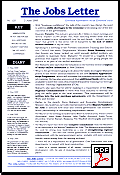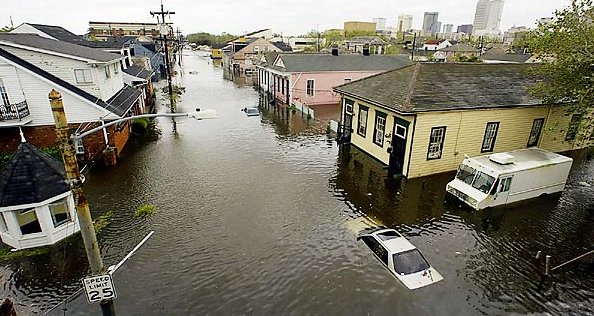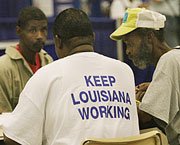



|
 |

|
| No.239 | 15 September 2005 | Essential Information on an Essential Issue |
of key events over the last few weeks. HURRICANE KATRINA 400,000 JOBS WASHED AWAY CONTRIBUTIONS FOR STORM VICTIMS EMPLOYMENT STRATEGY UPDATE BERL PREDICTS PLENTY MORE NEW JOBS WORK FOR THE DOLE SCHEMES OUTLINED NATIONALíS SKILLS POLICIES ASHBURTON COLLEGE TRADES SKILLS PLAN ACCOUNTING GRADS LEAVING FOR LONGER EEO: ADAPT PRACTICES THAT KEEP OLDER WORKERS BIG LEAPS ... BIG GULPS  LAST Letter
LAST Letter
NEXT Letter   Download this issue as a PDF file
Index to Features
23 August 2005Australian Minister of Industry Ian MacFarlane says Australia needs to continue industrial reform so labour prices could eventually match those of NZ. However, Australian opposition leader Kim Beazley points out that bringing Australian wages in line with NZ rates would slash Australian pay packets by 30%. 28 August 2005Unemployment in Zimbabwe reaches 80% and inflation recently peaked above 300%. And the country's Ministry of Health now estimates that a quarter of all Zimbabweans between the ages of 25 and 45 are HIV positive. Life expectancy has plummeted from around 63 years in the late 1980s to under 34 years in 2004. UN Under-Secretary-General for Humanitarian Affairs Jan Egeland describes Zimbabwe as being in "melt-down". General Motors Holden is to cut 1,400 people from its Australian workforce. 29 August 2005There are now a thousand more people working in the roading industry than there were last year, according to Minister of Employment Steve Maharey. The Maori Party calls for the minimum wage to be raised to $12.50/hr. Hurricane Katrina hits the southern coast of the United States leaving unknown numbers of people dead, tens of thousands homeless and scores of towns devastated including the city of New Orleans. 30 August 2005Job cuts are inevitable as Telecom NZ announces it is investing in "triple play" — voice, data and video services — using VoIP (Voice over Internet Protocol) technology. 105 jobs are to go from Southern Community Laboratories, a company that operates 20 Auckland blood collection facilities. The company has not had its contract renewed. Workers in Nelson and Marlborough are paid 7%-15% less than similar jobs nationally, according to a survey by recruitment agency Fanselow Bell. Consultant Judy Fanselow says many people choose to live in the area because of the lifestyle and are happy to accept lower rates of pay. 1 September 2005The Industry Training Federation says the National Party's policy on skills (see this issue of the Jobs Letter) contains some good ideas. Executive director Darel Hall says that while there are many details to work through, "... the signals are right". A report on Western Australian construction industries predicts there will be an additional 20,000 workers needed annually until 2010 to cater for a rise in overall job demand in the state. The Egyptian government says unemployment stands at about 10% but unofficial estimates are about twice that figure. Some economists say that even if the Egyptian economy hit 6% growth this year, this would only keep unemployment at current levels. German unemployment dropped slightly to 11.4% in August. There are over 4.7 million Germans unemployed. The Philadelphia Daily News points out that despite 2004 being one of the worst hurricane seasons in history, the US federal government imposed the steepest reduction in hurricane and flood control funding in New Orleans' history. Because of this, much of the levee and other floodwater maintenance projects in the area had not been carried out. The funding had apparently been reallocated to the Department of Homeland Security, the agency set up to keep Americans safe from terrorism. 2 September 2005The NZ Green Party calls for the minimum wage to be lifted to $12/hr (from $9.50), including for workers aged 16_17 who currently get a youth rate that is 80% of the adult rate. The BNZ expects rises in fuel prices alone to push inflation up an entire percentage point. The bank predicts inflation to hit 3.8% this coming year. 5 September 2005NZ nurses are to be to the target of aggressive recruiting by New South Wales health services. The Australian state requires 1,810 nurses and in November it will launch a campaign to attract staff from NZ as well as the UK, North America and Scandinavia. A week after Hurricane Katrina, nearly 60% of oil production from the Gulf of Mexico is still off-line and nearly one million barrels of oil are not being refined due to refineries affected by storm damage. In efforts to reduce the economic impact of the disrupted oil supplies, the US government will put as much as one million barrels of oil per day from its Strategic Petroleum Reserve on the international market. And members of the International Energy Agency are expected to release a similar amount of stockpiled oil during the next month to "help ease supply constraints". 6 September 2005National Party leader Don Brash says he would resurrect his party's housing policy and return to market-rental rates for state houses. Brash says that an increase in the accommodation supplement would see no one with a state house worse off. CPAG spokesperson Donna Wynd says it is well documented that the last time a market-rental scheme for state housing was instituted it had a devastating affect on generation of NZ children. She says the accommodation supplement has not solved the national housing affordability crisis and probably helped fuel the property bubble in the first place. The Industry Training Federation says 82% of chief executives and company chairpersons want an increase in industry training. Executive director Darel Hall says skills shortage is business' biggest problem and industry training is "clearly a key solution". 7 September 2005A pilot programme to put off-season meatworkers into farm jobs is declared a success and will be expanded throughout Southland next year. The Seasonal Careers, Your Choice pilot saw 15 meatworkers do an eight-day course in theory and practical skills to equip them for farm work. The Wairarapa is investigating the idea of building a new town in the district. Economic and Tourism Development agency Go Wairarapa says the region's population has been static for 10-15 years and is forecast to decline after the next decade. Economic Development manager Geoff Copps says a new town is one idea that would help the district grow its population by 10,000 in 20 years. The US Federal government, which has so far promised $62.3 billion towards hurricane relief in the southern United States expects the recovery and relief operations will be between $100 billion to $200 billion. Cuba offers to send 1,500 doctors to the Untied States to provide free medical services to hurricane victims. The Bush Administration refuses the offer. Venezuelan President Hugo Chavez offers the US 1 million barrels of gasoline and a $5 million donation, but has also criticized the US government for failing to evacuate the victims before disaster struck. Chavez: "The rich were able to leave, by their own means. It was the poor that remained there." 9 September 2005170 jobs will go in Napier as British American Tobacco plans to close NZ's biggest cigarette factory next year. The company is shifting production to Sydney saying the decision is inevitable due to declining volumes for tobacco products being sold in NZ, Australia and the Pacific. ANZ Bank plans to export more back-office jobs to India. The bank says no customer roles will be sent off-shore but the bank is speeding up a programme to put technology in low-cost areas such as India. 13 September 2005The Every Child Counts Campaign publishes the political parties' responses to key Every Child Counts platforms. They can be found here. 14 September 2005Student loan debt tops $8 billion.
 LAST Diary
LAST Diary
NEXT Diary 
|

HURRICANE KATRINAThe storm was clearly predicted to hit the coastal mainland three days before it did. However, the ad hoc evacuation of the at-risk parts of Mississippi, Louisiana and Alabama appeared to have become a free-for-all of people buying airline and bus tickets while others drove through hours of traffic jams to escape the storm's trajectory. Tens of thousands of people were left behind— primarily black Americans who either didn't have a vehicle, didn't have the money for petrol, were too old or infirm to make arrangements, had nowhere to go, or simply refused to leave. Source — New Zealand Herald, 3 September 2005, "Storm brews around Bush leadership" by Andrew Gumbel; Philadelphia Daily News, 2 September 2005, "Poor blacks worse hit" by William Bunch400,000 JOBS WASHED AWAY The US Congressional Budget Office estimates that 400,000 jobs have been washed away
by the storm and there is no realistic timeline for their return. Many people who have the ability to
leave southern Louisiana have already gone, abandoning the region to look for work elsewhere. The
impact of job losses are expected to be greatest for the poor people, many of whom worked in service
industries that rely on tourism which, of course, has come to a standstill. The US Congressional Budget Office estimates that 400,000 jobs have been washed away
by the storm and there is no realistic timeline for their return. Many people who have the ability to
leave southern Louisiana have already gone, abandoning the region to look for work elsewhere. The
impact of job losses are expected to be greatest for the poor people, many of whom worked in service
industries that rely on tourism which, of course, has come to a standstill.
At Shreveport, North Louisiana, Jesse Schmidt of Goodwill says: "We are seeing a number of people staying here with family and friends. Our concern is to immediately help these people get into jobs, so they can earn some money to survive in the days and weeks ahead." Dozens of make-shift job fairs for victims of the hurricane have been set up all around the United States. The Texas Workforce Commission says it had received so many responses from firms offering jobs to storm victims that it had set up a toll-free number for employers to call. Katrina refugees will face unique challenges as many people wouldn't have taken the documentation of their qualifications — such as teaching or trade certificates — as they fled the storm. And the storm refugees have struggled to provide references or job histories because there is no way to reach their employers. The US Department of Labor is providing a national emergency grant of $191 million to states who are housing large numbers of refugees. The money is to help give displaced people temporary jobs providing food, clothing, shelter and humanitarian assistance for their fellow survivors. It will also be used to make needs-related payments to individuals not qualified for disaster unemployment assistance or unemployment insurance, or for those who have exhausted those benefits. Source — The Associated Press media release, September 8 2005, "Katrina wipes out job gains"; USA TODAY, 9 September 2005 "After searching for food and shelter, now comes job hunt", by Stephanie Armour; Los Angeles Times, 8 September 2005, Katrina's aftermath: hurricane to cost U.S. 400,000 jobs ", by Jesus Sanchez staff writer; BBC News UK edition, 8 September 2005, Thousands lose jobs after Katrina; Seattle Post-Intelligencer, 7 September 2005, "Job fairs help Katrina victims find work" by Kristen Hays; CNN.com, 10 September 2005, "Admiral takes over Katrina relief".
CONTRIBUTIONS FOR STORM VICTIMSSource — Bloomberg.com, 8 September 2005, "U.S. House Approves $51.8 Billion More for Hurricane Recovery". Yahoo! news, 4 September 2005, "Katrina Aid Pours in From Around the World" by Maamoun Youssef, Associated Press Writer; New York Sun, 8 September 2005, "US rejects Cuban aid, 20 million barrels of Iranian oil", by Eli LakeEMPLOYMENT STRATEGY UPDATEThe report also says the social and economic challenges facing Maori and Pacific peoples — who will contain the largest growing group of young people entering work — must be addressed. Strategies are needed to ease the transitions between work and other aspects of people's lives, including their community responsibilities. It also means making it easier for people to combine work and other important parts of their lives such as study, family, retirement and leisure. The report says ongoing learning in the workplace will be an important component, as will more flexible approaches to job design.
BERL PREDICTS PLENTY MORE NEW JOBS Business and Economic Research (BERL) predicts the New Zealand economy will remain
robust and add 40,000 new jobs in 2006 and 60,000 more in 2007. The forecast is in marked contrast to
the Reserve Bank prediction that says that job growth will slump to nothing by 2007. Business and Economic Research (BERL) predicts the New Zealand economy will remain
robust and add 40,000 new jobs in 2006 and 60,000 more in 2007. The forecast is in marked contrast to
the Reserve Bank prediction that says that job growth will slump to nothing by 2007.
BERL senior economist Ganesh Nana comments that whoever wins the pending election, he doesn't expect the "strident job-cutting" the country experienced during the Shipley/Richardson era. Nana says there is some anxiety for our economy around the growing current account deficit, the risk posed by the huge deficit spending by the United States' government, and rising oil prices. But he predicts New Zealand's economic growth to remain 3% or higher over the period. Source — Dominion Post, 7 September 2005, "Job growth predicted to continue" by James Weir.
WORK FOR THE DOLE SCHEMES OUTLINEDHowever, the party's environment spokesperson Nick Smith intends to set up community work schemes for long-term and young unemployed to "enhance" the environment. Smith says the schemes would be similar to Taskforce Green and involve tasks such as pest control and cutting tracks. He says people will work 40 hours per week and would be paid the dole — and the employing agency would be required to top that amount up to the minimum wage. He anticipates 50 to 100 schemes employing 10 to 20 people each with the first of them beginning next year. Source — New Zealand Herald, 14 September 2005, Work for the dole says National, By Anne Beston; Media release Green Party by Sue Bradford, 14 September 2005, "Work-for-the-dole is bad for the social environment".NATIONAL'S SKILLS POLICIES The National Party has also launched its trades and skills policy. Education spokesperson
Bill English says New Zealand needs a wider range of opportunities to increase the skills base across
the workforce. English says the National Party would expand trades training facilities in schools and
create achievement standards so "business" can be taught as a fully accredited school subject. It
would broaden the number of industries that are able to offer Modern Apprenticeships, increase funding
for polytechnics which offer trades-related courses, and work with small and medium sized enterprises
to make industry training more attractive to them. The party would also encourage the development
of high-level workplace training — beyond apprenticeships — for specialised technical skills,
management and supervision. The National Party has also launched its trades and skills policy. Education spokesperson
Bill English says New Zealand needs a wider range of opportunities to increase the skills base across
the workforce. English says the National Party would expand trades training facilities in schools and
create achievement standards so "business" can be taught as a fully accredited school subject. It
would broaden the number of industries that are able to offer Modern Apprenticeships, increase funding
for polytechnics which offer trades-related courses, and work with small and medium sized enterprises
to make industry training more attractive to them. The party would also encourage the development
of high-level workplace training — beyond apprenticeships — for specialised technical skills,
management and supervision.
Source — National Party website, 1 September 2005, "National's plan for trades and skills" by Bill English.
ASHBURTON COLLEGE TRADES SKILLS PLANSchool deputy principal Chris Buckland says the course is a pathway for some students to move into the local community workforce. The students who are accepted into the course are only at school for two days a week, with the rest of the time spent in workplaces. The expectation is for the students to stay in the programme for the whole year and one of the criteria for the businesses that participate in it is that they agree they won't employ students before the end of that school year. Enterprise Ashburton manager Tim Fitzgerald says the programme is one way of addressing the persistent skills shortage. And it's a better strategy than trying to recruit foreign workers into the district because it means the town is investing in its own local young people. Source — The Ashburton Guardian, 30 August 2005, "Aiming to address skills shortage" by Susie Nordqvist
ACCOUNTING GRADS LEAVING FOR LONGERThis in itself is not unusual, but what has changed is that the New Zealand graduates are staying away for longer, possibly because of their student debt. Accounting graduates now are more likely to be away for five years, as opposed to the traditional two years of overseas travel and work experience. And when they do come back, the report says that the graduates are tending to find the experience they got in large organisations was so specialised they have trouble meeting the broader requirements of smaller, New Zealand companies. The report says New Zealand employers are overlooking key pools of talent that include foreign-born candidates, women returning to the workforce and elder workers who might stay on, if they could cut back on their work. Source — Dominion Post, 8 September 2005, "Global talent war hits firms hard" by Roland van den Bergh.EEO: ADAPT WORKPLACES TO ATTRACT OLDER WORKERS New Zealand's skill shortage could be eased by better retaining people in the labour market
after they have retired, according to the Equal Employment Opportunities commissioner Judy
McGregor. McGregor says that with unemployment near a 20-year low, employers have to be more creative
about wooing workers who are considering retiring to remain in the labour market. She says retention
incentives such as phased-retirement, negotiated transitions, less conventional part-time and flexible
work arrangements, and new ways of working all need active consideration in policy and practice.
McGregor says many employees aged 65 and older would stay on at work with the right encouragement but
some employers would have to change their thinking and overcome negative stereotypes about the value
of mature workers. New Zealand's skill shortage could be eased by better retaining people in the labour market
after they have retired, according to the Equal Employment Opportunities commissioner Judy
McGregor. McGregor says that with unemployment near a 20-year low, employers have to be more creative
about wooing workers who are considering retiring to remain in the labour market. She says retention
incentives such as phased-retirement, negotiated transitions, less conventional part-time and flexible
work arrangements, and new ways of working all need active consideration in policy and practice.
McGregor says many employees aged 65 and older would stay on at work with the right encouragement but
some employers would have to change their thinking and overcome negative stereotypes about the value
of mature workers.
Source — New Zealand Herald, 19 August 2005, "Bosses told to give older workers a go" by NZPA
BIG LEAPS ... BIG GULPSAuthors Mike Fitzsimons and Nigel Beckford say they were inspired to write the book after hearing horror stories from fellow mid-lifers trapped in jobs they couldn't wait to leave. Fitzsimons says too many Kiwis endure work they don't like or they've done for too long: "According to recent workplace surveys, only 17% of Kiwi workers feel any sense of connection to where they work. Sixty-eight percent of us don't rate our boss or the management and only 25% of us are actually happy in our jobs. After a Christmas break, up to 1 in 14 of Kiwi workers visited an internet recruitment site to look at alternatives. You can't help but conclude that many New Zealanders are dissatisfied and restless at work …" The case studies featured in the book include a corporate executive turned social worker, a publican turned university lecturer, a builder turned fly-fishing guide and a teacher turned lawyer. Fitzsimons: "These people all had the courage to follow their passions rather than their pensions. They realised they had another 20 to 30 years of working life ahead and decided to do something new and more fulfilling. Many had already enjoyed successful careers, but they still decided to change..."
Source — Press Release 25 July 2005 from Fitzbeck publishing "Kiwi mid-lifers Ring the Changes"
We are funded by sustaining grants and donations. Yes, you can help.
|